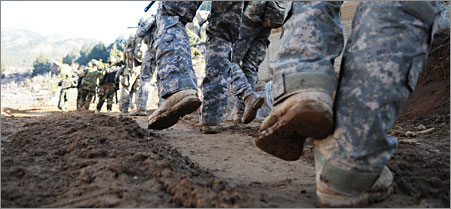Defense unable to track deployed troops' use of psychiatric drugs
The Military Health System cannot identify the soldiers taking prescribed drugs for mental illness, raising the risk they could experience adverse drug interactions when treated for battlefield wounds.
 The Army estimates 17 percent of troops in Afghanistan take either antidepressants or sleeping pills.
The Army estimates 17 percent of troops in Afghanistan take either antidepressants or sleeping pills.
This article was updated at 3:19 pm on Tuesday, June 8.
The Defense Department's Military Health System cannot track the use of prescription medications, especially psychotropic drugs such as antidepressants, and antipsychotic drugs used by troops engaged in combat operations in Afghanistan and Iraq, according to a report released by the Senate Armed Services Committee on Monday.
At a hearing in March, members of the Military Personnel Subcommittee of the Senate Armed Services Committee described widespread use of prescription drugs throughout the services and by deployed troops.
Sen. Jim Webb, D-Va., estimated that one out of six service members is taking some form of psychiatric drug. Sen. Benjamin Cardin, D-Md., said internal Army studies showed that 12 percent of its troops in Iraq and 17 percent in Afghanistan have been prescribed either antidepressants or sleeping pills.
Army statistics indicate "we have an alarming use in the increase of antidepressants," Cardin said. "In 2005, there were a little over 4,000 combat troops using antidepressants. That's about 1 percent. By 2007, it grew to over 19,000, or 5 percent, of our troops on antidepressants. That's a huge increase in the use of antidepressants. And that number remained pretty constant for 2008."
Lt. Gen Eric Schoomaker, Army Surgeon General, discounted these figures, and told the panel that Army surveys showed between 3 percent and 6 percent of deployed troops had been prescribed drugs to treat mental health or stress problems, while 8.6 percent of 550,000 active-duty soldiers were prescribed drugs to treat depression and anxiety or to help them sleep.
But according to the committee's report , which accompanied the fiscal 2011 Defense Department authorization bill, the Military Health System is unable to track drugs prescribed to deployed troops. In response to follow up questions from the March hearing, Defense informed the committee that the Military Health System's Pharmacy Data Transaction Service "has no visibility of pharmacy data for prescriptions dispensed in forward operating areas."
Officials with the Military Health System did not respond to queries on whether or not it can track prescriptions for troops in Iraq or Afghanistan. But a description of the Pharmacy Data Transaction Service posted online says it serves only Defense hospitals, retail pharmacies that supply prescription drugs to military personnel and their families enrolled in the TRICARE health insurance program, and mail order pharmacies that support troops and their families.
The MHS Pharmoeconomic Center website prominently displays a link to Deployment Medication Resources, but the link returns an error message when clicked.
Frank Ochberg, a professor of clinical psychiatry at Michigan State University and a former associate director of the National Institutes of Mental Health, said he was concerned that Defense was sending troops who needed psychotropic drugs to treat a diagnosed mental condition into combat.
Ochberg, who has years of experience in the treatment of post-traumatic stress disorder, said he was dismayed to learn that Defense was not tracking drugs prescribed to deployed troops since accepted standards of care requires it.
Paul Sullivan, executive director of Veterans for Common Sense, said he does not understand how Defense can send drugs to remote locations in Afghanistan and Iraq and not know how to track them electronically or include the prescription data in the AHLTA electronic health record, a Defense system that stores soldiers' health records.
Lack of prescription drug records could cause problems for troops medically evacuated from combat, because doctors would not know the psychiatric drugs a soldier could be taking, possibly leading to harmful interactions with other prescribed drugs at stateside hospitals, Sullivan said.
The Military Health System must quickly develop a database of all drugs prescribed to deployed troops, he said. "This needs to be fixed now," he said.
In its report, the Senate Armed Services Committee said it expects Defense to expeditiously develop "a reliable method to track and manage the prescription and use of pharmaceuticals, to include psychotropic medications, by deployed service members."
NEXT STORY: Senate: Everyone Wear Same Camo






